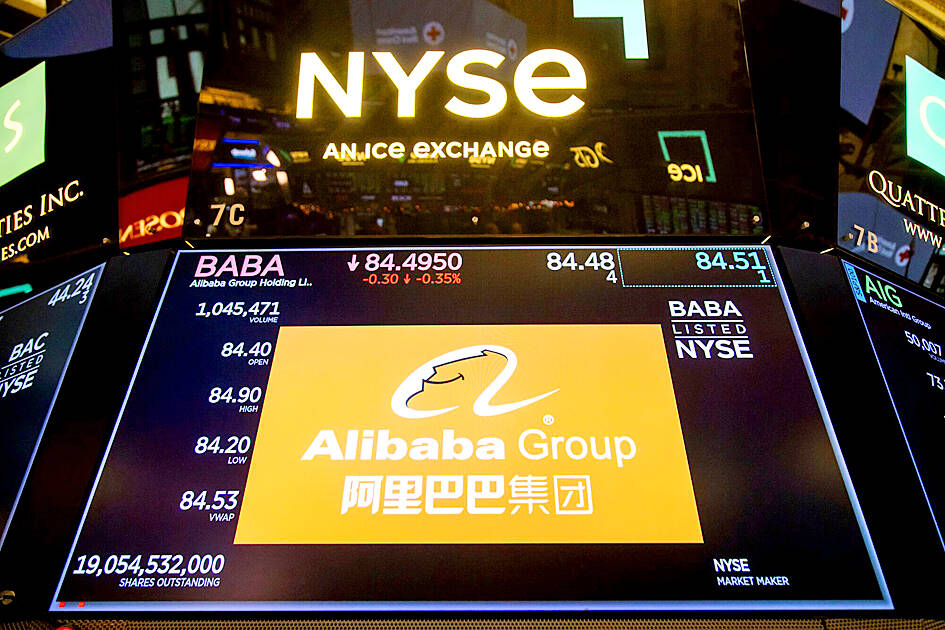Chinese technology company Alibaba Group Holding Ltd (阿里巴巴) yesterday released a new version of its Qwen 2.5 artificial intelligence (AI) model that it said surpassed the highly acclaimed DeepSeek-V3.
The unusual timing of the Qwen 2.5-Max’s release, on the first day of the Lunar New Year when most Chinese people are off work and with their families, points to the pressure Chinese AI start-up DeepSeek’s (深度求索) meteoric rise in the past three weeks has placed on not just overseas rivals, but also its domestic competition.
“Qwen 2.5-Max outperforms ... almost across the board GPT-4o, DeepSeek-V3 and Llama-3.1-405B,” Alibaba’s cloud unit said in an announcement posted on its official WeChat account, referring to OpenAI and Meta Platforms Inc’s most advanced open-source AI models.

Photo: Bloomberg
The Jan. 10 release of DeepSeek’s AI assistant, powered by the DeepSeek-V3 model, as well as the Jan. 20 release of its R1 model, has shocked Silicon Valley and caused tech shares to plunge, with the Chinese start-up’s purportedly low development and usage costs prompting investors to question huge spending plans by leading AI firms in the US.
However, DeepSeek’s success has also led to a scramble among its domestic competitors to upgrade their own AI models.
Two days after the release of DeepSeek-R1, TikTok owner ByteDance Ltd (字節跳動) released an update to its flagship AI model, which it said outperformed Microsoft Corp-backed OpenAI’s o1 in AIME, a benchmark test that measures how well AI models understand and respond to complex instructions.
This echoed DeepSeek’s claim that its R1 model rivaled OpenAI’s o1 on several performance benchmarks.
The predecessor of DeepSeek’s V3 model, DeepSeek-V2, triggered an AI model price war in China after it was released in May last year.
The fact that DeepSeek-V2 was open-source and unprecedentedly cheap, only 1 yuan (US$0.14) per 1 million tokens — or units of data processed by the AI model — led to Alibaba’s cloud unit announcing price cuts of up to 97 percent on a range of models.
Other Chinese tech companies followed suit, including Baidu Inc (百度), which released China’s first equivalent to ChatGPT in March 2023, and the country’s most valuable Internet company, Tencent Holdings Ltd (騰訊).
Liang Wenfeng (梁文鋒), DeepSeek’s enigmatic founder, said in a rare interview with Chinese media outlet Waves in July last year that the start-up “did not care” about price wars and that achieving AGI (artificial general intelligence) was its main goal.
OpenAI defines AGI as autonomous systems that surpass humans in most economically valuable tasks.
Liang said he believed China’s largest tech companies might not be well suited to the future of the AI industry, contrasting their high costs and top-down structures with DeepSeek’s lean operation and loose management style.
“Large foundational models require continued innovation, tech giants’ capabilities have their limits,” he said.

TAKING STOCK: A Taiwanese cookware firm in Vietnam urged customers to assess inventory or place orders early so shipments can reach the US while tariffs are paused Taiwanese businesses in Vietnam are exploring alternatives after the White House imposed a 46 percent import duty on Vietnamese goods, following US President Donald Trump’s announcement of “reciprocal” tariffs on the US’ trading partners. Lo Shih-liang (羅世良), chairman of Brico Industry Co (裕茂工業), a Taiwanese company that manufactures cast iron cookware and stove components in Vietnam, said that more than 40 percent of his business was tied to the US market, describing the constant US policy shifts as an emotional roller coaster. “I work during the day and stay up all night watching the news. I’ve been following US news until 3am

Six years ago, LVMH’s billionaire CEO Bernard Arnault and US President Donald Trump cut the blue ribbon on a factory in rural Texas that would make designer handbags for Louis Vuitton, one of the world’s best-known luxury brands. However, since the high-profile opening, the factory has faced a host of problems limiting production, 11 former Louis Vuitton employees said. The site has consistently ranked among the worst-performing for Louis Vuitton globally, “significantly” underperforming other facilities, said three former Louis Vuitton workers and a senior industry source, who cited internal rankings shared with staff. The plant’s problems — which have not

TARIFF CONCERNS: The chipmaker cited global uncertainty from US tariffs and a weakening economic outlook, but said its Singapore expansion remains on track Vanguard International Semiconductor Corp (世界先進), a foundry service provider specializing in producing power management and display driver chips, yesterday withdrew its full-year revenue projection of moderate growth for this year, as escalating US tariff tensions raised uncertainty and concern about a potential economic recession. The Hsinchu-based chipmaker in February said revenues this year would grow mildly from last year based on improving supply chain inventory levels and market demand. At the time, it also anticipated gradual quarter revenue growth. However, the US’ sweeping tariff policy has upended the industry’s supply chains and weakened economic prospects for the world economy, it said. “Now

UNCERTAINTY: Innolux activated a stringent supply chain management mechanism, as it did during the COVID-19 pandemic, to ensure optimal inventory levels for customers Flat-panel display makers AUO Corp (友達) and Innolux Corp (群創) yesterday said that about 12 to 20 percent of their display business is at risk of potential US tariffs and that they would relocate production or shipment destinations to mitigate the levies’ effects. US tariffs would have a direct impact of US$200 million on AUO’s revenue, company chairman Paul Peng (彭雙浪) told reporters on the sidelines of the Touch Taiwan trade show in Taipei yesterday. That would make up about 12 percent of the company’s overall revenue. To cope with the tariff uncertainty, AUO plans to allocate its production to manufacturing facilities in